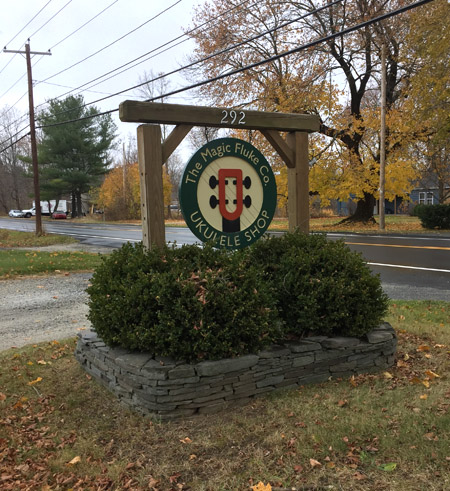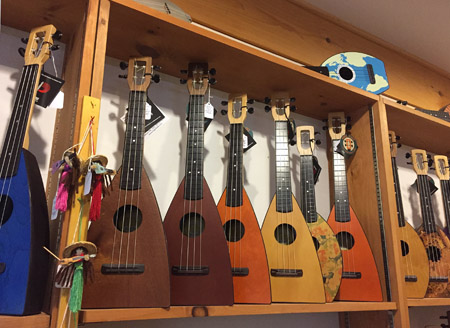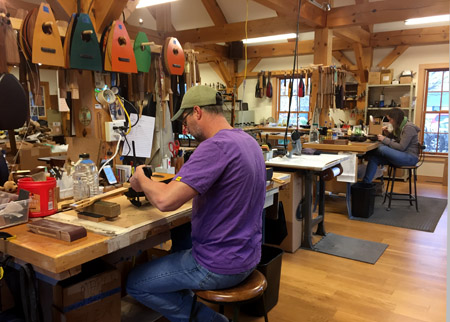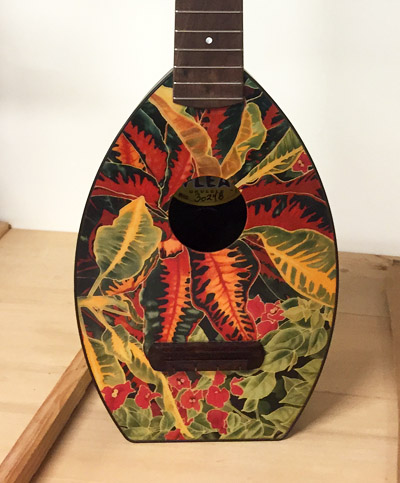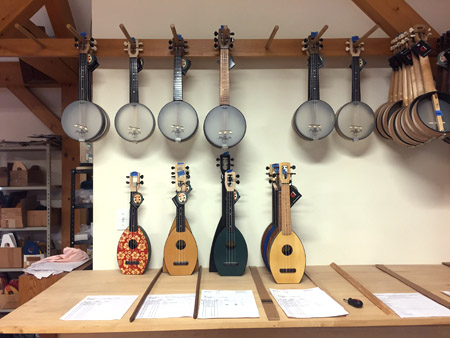Drive along Route 7 in the Southern Berkshire town of Sheffield, Massachusetts and it’s hard to miss The Magic Fluke Company. Founded by Dale and Phyllis Webb in 1999, the company turns out several thousand musical instruments a year. All design, finishing, and assembly takes place inside a timber-framed manufacturing facility, whose solar panels provide electricity.
The Webbs and their half dozen employees pride themselves on making musical instruments that sound great, are well designed and affordable, and are assembled from mostly locally sourced materials and parts. “We are not luthiers,” Phyllis said, “although the instruments are all hand done. Dale’s design is innovative, bringing together injection molded parts and wood.” Phyllis credits her brother, Jumpin Jim Beloff, for the recent wave in popularizing and teaching the ukulele. Jim’s numerous instruction manuals line a shelf in the showroom. The ukulele’s wide appeal is easy to understand. “It’s the easiest instrument on the planet to learn to play,” Phyllis say, adding that “it brings people together, it’s affordable, and because of the composite . . . it can take a beating.”
“Fluke” refers to the original style of ukulele the company makes. One with a different shape is called “The Flea.” A banjo ukulele is known as “The Firefly” and a violin-inspired instrument is named “The Cricket.” All are extremely portable, ideal for traveling and camping.
Dale ‘s background in molded plastics, materials research, and acoustics has served the company well. It is the business aspect of running the company that remains the most challenging. “For a long time, we were the only serious manufacturer doing any kind of volum with an affordable instrument. But since it’s gotten so popular, so many of the larger companies are now producing overseas and they’re really putting the squeeze on our profits. . . But still, we’re hanging in there. We do a lot of colorful, unique designs. . . we work hard and tr to keep everything as local as we can.”
The main room of The Magic Fluke facility has a number of different assembly stations, each for different parts. Unfinished fingerboards, ukulele tops, and assembled ukuleles ready for stringing hang on vertical posts and rafters around the well lit room.
One of the more unique things about Magic Fluke is their ability to produce one-of-a-kind instruments using a process called dye sublimation. They can take an artist’s work and transfer it directly onto the face of the instrument, embedding it right into the wood using a heat process.
Locally sourced and manufactured, Magic Fluke’s instruments find their way into the hands of musicians around the globe. They are also supplied to area libraries and schools, replacing the once ubiquitous recorder as a 3rd grade starter instrument. The Magic Fluke’s presence in the community has even inspired a multi-generational ensemble: the Berkshire Ukulele Band.
“[The ukulele] crosses generational lines — young, old, and socio-economic,” Phyllis notes. “In light of today, I often say, that if we were all playing the ukulele, I think that we’d have a better sense of community.”

